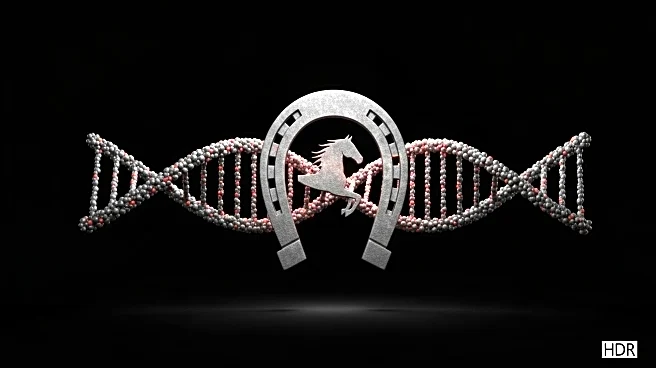What's Happening?
A recent study published in the journal Science has uncovered a genetic mutation that may have been pivotal in the domestication of horses, making them rideable. Led by Xuexue Liu and Ludovic Orlando from the Center for Anthropology and Genomics in Toulouse, France, the research analyzed DNA from ancient horse remains. The study focused on 266 genetic markers linked to traits such as coat color, body shape, locomotion, and behavior. The findings suggest that selective breeding favored a genetic region associated with the ZFPM1 gene, which is likely related to tameness and behavior. Additionally, changes in the GSDMC locus, linked to body shape and spine structure, were identified as crucial in transforming wild horses into rideable ones. These genetic changes became dominant in the horse population within a few centuries, contributing to the rise of horse-based mobility around 4,200 years ago.
Why It's Important?
The discovery of the genetic mutation that facilitated horse domestication is significant as it sheds light on the evolutionary processes that enabled early humans to harness horses for transportation, warfare, and agriculture. This advancement played a crucial role in societal development, allowing for increased mobility and the expansion of civilizations. Understanding the genetic basis of domestication can also inform current breeding practices and conservation efforts, ensuring the preservation of genetic diversity in modern horse populations. Furthermore, the study highlights the importance of genetic research in uncovering historical human-animal interactions and their impact on societal progress.
What's Next?
Further research is needed to explore the effects of the ZFPM1 gene, known as the 'tameness gene,' and other traits it may have influenced. Scientists aim to conduct more detailed studies on polygenic traits, which are characteristics influenced by multiple genes, to understand how they have shaped horse evolution. Additionally, researchers plan to investigate how horses adapted to their local environments, providing insights into the genetic factors that contributed to their domestication and success as a species.
Beyond the Headlines
The study of horse domestication through genetic mutations offers broader implications for understanding domestication processes in other species. It raises ethical considerations regarding selective breeding and genetic manipulation in modern animal husbandry. The findings also contribute to discussions on the role of genetics in shaping animal behavior and the potential for using genetic insights to address challenges in conservation and biodiversity.









